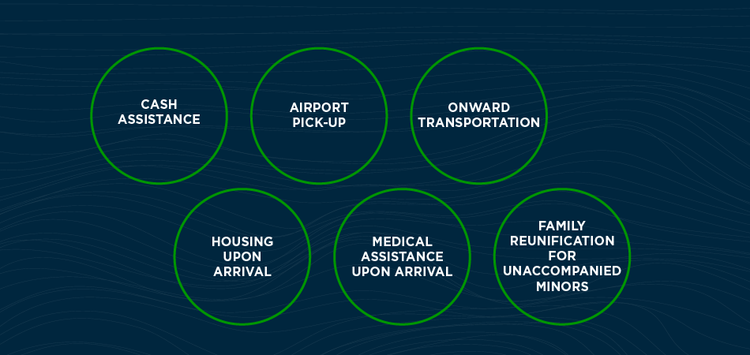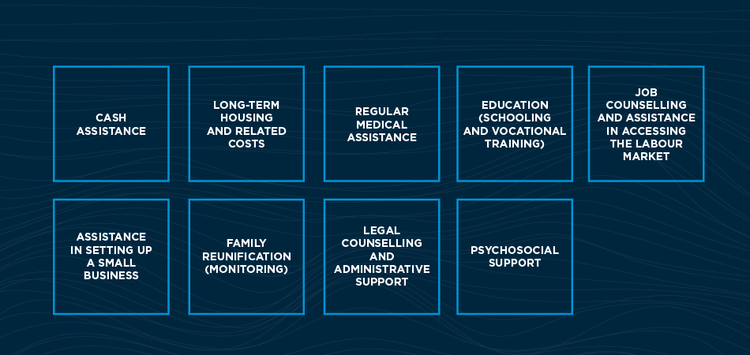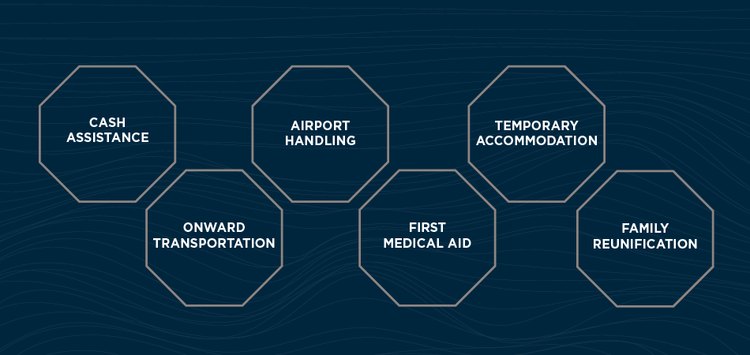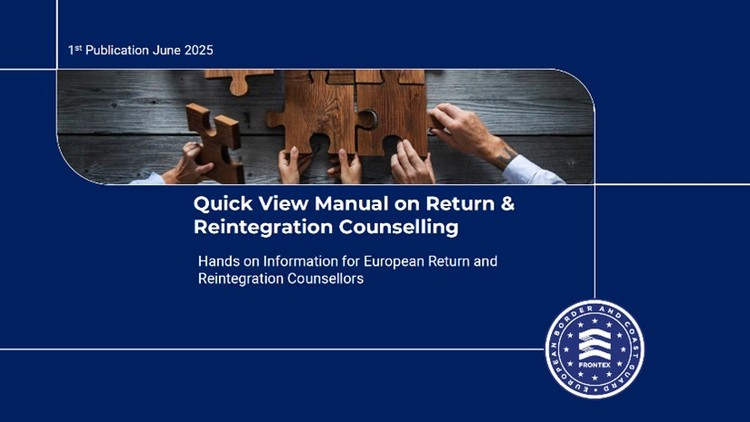Reintegration assistance refers to the support provided to migrants returned to their countries of origin. In accordance with its mandate, defined in the legal basis, Frontex supports EU Member States and Schengen Associated Countries in providing reintegration assistance both during the first days following the arrival in the country of origin (post-arrival assistance), as well as longer-term assistance up to 12 months (post-return assistance) to help third country nationals reintegrate into their societies. Examples of assistance provided include support with starting a small income generating activity, accommodation, medical assistance, job counselling, education, legal services and other.
Reintegration assistance

The legal basis for reintegration assistance is Article 48 (1) (a) (i) of Regulation (EU) 2019/1896 on the European Border and Coast Guard. Frontex also contributes to the return policy of the EU, in particular in the EU Strategy on Voluntary Returns and Reintegration.
Additional language versions: Arabic (AR), French (FR), Spanish (ES), Farsi (FA), Hindi (HI), Armenian (HY), Georgian (KA), Turkish (TR), Urdu (UR) Albanian (ALB), Bengali (BEN), Macedonian (MAC), Mongolian (MON), Portuguese (PT), Russian (RUS), Serbian (SRP) and Kurdish (KU) in two variants Kurmanji and Sorani are available in the Public Register of Documents.
EU Reintegration Programme
These reintegration assistance activities and/or services are currently being implemented by Member States through various national and EU programmes involving a broad range of partners around the globe offering such assistance. However, the landscape of policies, practices, and capacities in Member States for implementing reintegration assistance is very diverse. Some Member States have built up large capacities in this area, while others have not been able to do so due to capacity or budgetary constraints. The implementation of the EU Reintegration Programme as a European-wide provision of reintegration assistance with equal standards and equal treatment for third country nationals eligible for support aims to harmonise these efforts and ensures that all Member States can provide reintegration assistance with equal standards to third country nationals, with less administrative and financial obligations.
Frontex is not implementing these activities itself. It makes use of reliable reintegration partners operating around the globe providing post-arrival and post-return assistance. Their reintegration services are overseen by a dedicated Quality Monitoring and Evaluation Framework.
The activities under the EU Reintegration Programme are fully financed by the Frontex budget. The objective is to support
up to 7,000 people annually, both individuals and families, depending on the
needs of the Member States and the available budget.
Where do we work?

Who qualifies for reintegration assistance?
Not everyone can qualify for these services. Only third-country nationals returning both voluntarily and non-voluntarily who no longer fulfil the conditions to stay in the EU can be qualified. They can request reintegration assistance up to 6 months after departure from the host country.
Third country nationals with legal stay and those under the temporary protection directive do not qualify for reintegration assistance offered under the EU Reintegration Programme.
It is important to note that the EU Member
States and Schengen Associated Countries participating in the EU Reintegration Programme decide how the EU Reintegration Programme is implemented in
accordance with their national procedures and legislations.
Types of reintegration services
The services supported by Frontex are divided into three packages that can be used separately or combined.
Post-arrival package
These services or activities include the immediate assistance upon arrival in the country of origin and are organised and coordinated between the responsible Member State and the reintegration partner. This short-term assistance may include:

Post-return package
These services or activities include the long-term assistance activities which can be implemented up to 12 months after the date of departure. They may consist of:

The
post-return package is always a result of collaboration between the concerned third
country national, the responsible authority in the Member States, and the
contracted reintegration partner. Together, they develop a tailor-made reintegration
plan based on the person’s personal situation and needs. In this respect,
return and reintegration counselling is crucial to ensure that the person can make
an informed decision about the future, but also to increase the quality of the
reintegration assistance implemented delivered by the local reintegration
partner.

Reintegration Assistance Tool
The case handling of the EU Reintegration Programme is done through a digital platform, called the Reintegration Assistance Tool (RIAT), developed and owned by the European Commission. This online tool simplifies and standardises the exchange of information on the reintegration process to the best benefit of third country nationals, reintegration partners and Member States. It provides an end-to-end live overview of the case, including the application, the development and approval of a reintegration plan, and the reporting. Also, it also serves as an important source of data for evaluation and quality monitoring purposes.
The EU Reintegration Programme is currently active in 38 countries of origin. However, this number is expected to grow further in 2025, in line with the operational strategy on more effective returns. As mentioned above, Frontex is not implementing the reintegration assistance, instead it relies on the expertise of reliable reintegration partners from the civil society sector with whom Framework Partnership Agreements were concluded. They are:
- Caritas International Belgium,
- Women Empowerment, Literacy and Development Organization (WELDO),
- IRARA,
- European Technology and Training Centre (ETTC),
- Life Makers Foundation Egypt
- Micado Migration
To oversee the quality of services, a dedicated Evaluation and Monitoring Framework is in place.

Reintegration conference
Frontex’s Reintegration Conference is a regular event held by the Post-Return Unit (within the Return Division) to address reintegration policies and related topical issues in an interactive manner. It brings together authorities of EU and Schengen associated countries, reintegration partners, the European Commission, researchers, civil society organisations, and experts on migration.
As a unique forum for facilitating developments in the field of reintegration, the conference aims not only at increasing awareness of the main challenges in the reintegration assistance but also at initiating a profound discourse on further harmonisation of the post-return standards and their glossary across the EU. This meaningful debate encourages reflection on current strengths and areas with growth potential, exchange of best practices and development of key recommendations. Moreover, it examinates the realities of the reintegration in third countries in order to foster partnerships and create synergies where possible.
The conference is also the place where the concepts and innovations regarding return and reintegration counselling are discussed, exchanged and challenged. Its format is designed to enhance interaction through panel discussions, lectures and workshops that address the most crucial aspects in the post-return domain.
Return and Reintegration Counselling
Return counselling, when coupled with a migrant-centred
approach, is crucial to promote voluntary
returns and reintegration programmes. It is more than organising the logistical
aspects of the return process, but takes into account the complex emotional,
social, and economic factors influencing a migrant's decision to return to his or her home country – eventually aiming for a sustainable reintegration.
A migrant-centred approach ensures that the counselling process is tailored to
individual needs and circumstances. This means providing comprehensive,
accurate, and unbiased information about the return process, conditions in the
country of origin, and available reintegration assistance.
Critically, it involves active listening and empathetic engagement, empowering migrants to make an informed decision without coercion. When migrants feel heard, respected, and supported throughout the counselling process, they can take co-ownership, deciding on a better future, while actively engaging in using all available support schemes. This, in turn, significantly increases the likelihood of successful and durable reintegration, benefitting not only the individual but also his or her community and the broader society in third countries.
To help Return Counsellors in their daily tasks and challenges, Frontex has developed the Quick View Manual for return and reintegration counsellors, together with practitioners from EU Member States. It is a practical and easy-to-use resource that covers all relevant aspects of return counselling, ranging from communication, stress factors, decision making, and dealing with vulnerable groups to reintegration assistance.
It contributes to Frontex’s aim to support, align, and harmonise counselling efforts across Europe and may be used by all counsellors regardless of their organisational background.

EU Reintegration Programme success stories
Through the EU Reintegration Programme (EURP), Frontex provides essential support to migrants returning to their home countries. This type of reintegration support is fully financed by Frontex and implemented by reintegration partner organisations. One of them is EURP, which ensures equal treatment across EU Member States by offering accommodation, medical aid, job counselling, education, and other assistance for up to 12 months post-return. Watch EURP stories.